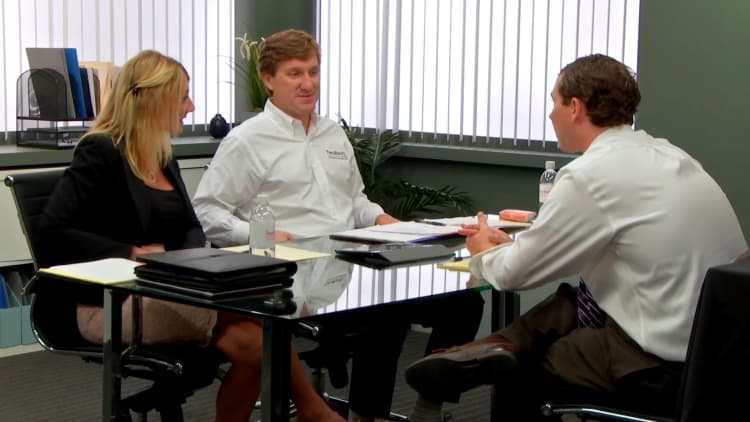When you've gone through an extensive job interview and don't hear back from the recruiter or hiring manager after several follow-up emails, you've been "ghosted."
It's easy to lose hope and confidence when this happens. For many job seekers, the experience is so frustrating that they tend to make things worse by sending one — or several — angry emails.
But a nasty, confrontational note is the wrong approach. As a career coach with 20-plus years of experience in hiring and recruiting, here's my advice to candidates who have been ghosted after a job interview:
Follow up (one last time) with a polite email
The best way to show professionalism is to start the email off with a positive tone.
If you begin with something like, "So it's been a few days and I still haven't heard back...," you'll come across as passive aggressive or rude, regardless of whether or not you mean to.
In your follow-up email, do three things:
1. Congratulate them on finding the right candidate. This one is a bit of a mind game, because you don't know if they've already filled the position. But expressing that you're happy for them, even though they didn't pick you, shows you have good spirit. Also, you'll likely get a response either correcting you (e.g., that they didn't hire anyone yet) or explaining the real reason why they didn't get back to you much sooner.
2. Ask them what you can do to stay on their radar for future opportunities. While you may be disappointed that you didn't get the job, don't make the mistake of closing the door completely. New positions will eventually come up, and one of them might be perfect for you. Make it clear that you're still interested in working at the company.
...this approach usually gets even the busiest recruiters and hiring managers to respond.J.T. O'DonnellFounder and CEO, Work It Daily
3. Mention one thing you enjoyed talking with them about. Was there a part of the interview conversation where you feel like you really connected with the interviewer? Bring it up! This is your opportunity to make yourself more memorable and stand out from other candidates who fell short.
Sample of a successful follow-up email
"Hi Kim,
I hope your search for the sales associate position is going well. And congratulations if you already found the right candidate; anyone you select would be lucky to work at such a great company.
I wanted to briefly reconnect to tell you that, while I might not have been a perfect fit for the role at this time, I loved meeting with everyone on the team. It only reaffirmed my desire to be part of your company's mission. I really hope we can keep in touch, so please let me know if there's anything I can do moving forward to be considered for future opportunities.
I truly appreciate your time and the opportunity to interview. I especially enjoyed our conversation about humble beginnings. Your story about how you worked your way up from an internship to a managerial position in just three years really inspired me, and it's something I'll always remember to keep me motivated throughout my career.
Thank you so much,
Amy"
In my experience, this approach usually gets even the busiest recruiters and hiring managers to respond. Some may simply reply with a simple "thank you" and "good luck," while others may offer you helpful feedback.
Still no response? Review your experience
If you don't get a reply after that last follow-up email, don't keep bombarding the employer with more messages. Instead, consider leaving an honest, but polite, review about your interview experience at a company review website, like Glassdoor or Indeed.
This isn't something that I recommend to everyone. Even though reviews are kept anonymous, many people aren't comfortable sharing their experiences online — and that's okay, too. Just learn from it and move on.
But keep in mind that websites like these help other candidates gain insights into the overall interview process at a specific company, how they secured an interview, the level of difficulty, questions to expect and more.
And your review isn't just helpful to job seekers: "It also benefits employers by helping their recruiters and hiring managers identify opportunities to improve their processes and communication so that future candidates can have a better experience," Sarah Stoddard, a career expert at Glassdoor, tells CNBC Make It.
"Research even confirms candidates use interviews to gauge what it'd be like to work for a potential employer, so it's in an employer's best interest to provide the best experience possible for their candidates," she adds.
Again, just be sure that your review is honest and isn't written out of anger and vengeance. One way to do this, depending on your experience, is to try including phrases like "I'm sure the hiring team was extremely busy" or "But one thing I did enjoy about the [company/process] was..."
The goal is to provide constructive feedback that genuinely encourages improvement.
Don't miss:
- I've been interviewing for 20 years—and these are the 3 best resume examples, based on experience level
- 'Never end the job interview before asking this No. 1 question,' says career expert of 15 years
- After 20 years of hiring, I now refuse to ask 'Tell me about yourself'—here's my new go-to interview question



